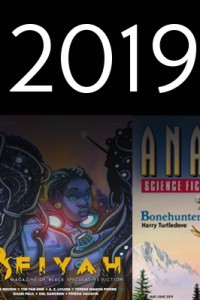Spotlight on: Apex

Jason Sizemore is the founder of Apex Publications, which publishes books and also produced Hugo Award finalist Apex Magazine (formerly Apex Digest) from 2005-2019, when the journal went on hiatus. The magazine has now been reborn, and Sizemore talked to us a bit about the history and future of the project.
After going on hiatus in 2019, Apex is coming back. Tell us about why you shut down, and why the time is right to return.
In late 2018, I experienced some serious health issues that culminated in a 13-hour surgery to replace my mandible with a large piece of my left fibula. Prior to the procedure, it was obvious I would be unable to run a major publication like Apex Magazine post-op, and I decided to place the ‘zine on indefinite hiatus.
I think most readers had decided Apex Magazine was dead. Understandable, as it’s how these things usually play out. Though I had my eye on a relaunch even before the surgery, I kept the plan to myself so that I could convalesce without having to meet an arbitrary timetable.
Around January of 2020, I finally started feeling close enough to normal and was clear of any planned major medical procedures (I had three in 2019). I found myself missing the grind of running the ‘zine. I love the interactions with my editorial team, our readers, artists, and writers. I needed Apex Magazine as a creative outlet. I needed Apex Magazine for my well-being.
I tried to gauge the genre community’s interest in the return of the ‘zine. My takeaway was that it would be welcomed with eager arms. Lesley Conner (my managing editor) and I planned a Kickstarter to fund the relaunch and decided to let the fans decide our fate. Incredibly, we funded in five hours.
The people had spoken. And here we are.
It’s been a difficult… journey. I’ve been left scarred on my neck, my leg, and mentally. I have partial paralysis in my lips and face. However, the surgery did leave me with a permanent titanium plate supporting my new jaw, so I’m able to tell everyone I’m part man, part machine!
I’m an editing cyborg!
What’s different about this incarnation of the magazine?
The hiatus did allow my team and me to slap a reset button and implement some procedural and product improvements. The monthly production grind was wearing me out. Now we’re bi-monthly (six issues per year), which cuts my ebook design and vendor management workload in half. To make up for the less frequent release schedule, we’ve doubled the amount of content. This extra time allows me to give the end product more polish and editorial shine.
I spent the summer building and implementing a new website design. We’ve improved readability, added an online shop to the site, and organized our content better.
We pay our writers, authors, artists, and editors more than we did in our previous incarnation.
Talk about the team you’ve put together to produce the magazine.
I’m returning as the editor-in-chief, and Lesley Conner will resume her role as managing editor. Maurice Broaddus is our special fiction editor. He’s our secret sauce. Maurice finds our reprints, recruits submissions from up-and-coming writers, and brings attention to writers he feels deserve a larger reader base.
Our other major addition is Shana DuBois as our non-fiction editor. Though we’ve published some great non-fiction in the past, I’ve long felt it’s been underserved. Shana is new to the world of editing, but she brings a broad scope of genre knowledge and has her pulse on what interests the genre community through her past job experiences.
KT Bryski returns as our podcast producer and audio engineer. Regular columnists AC Wise, Andrea Johnson, and Russell Dickerson also rejoin us.
Does Apex have a mission statement or a particular niche you’re trying to fill?
Strange. Surreal. Shocking. Beautiful.
Catherynne M. Valente, former editor-in-chief of Apex Magazine, used these four words to describe our fiction. Years later, we define ourselves by these qualities.
We strive to entertain our readers with interesting, diverse, and thought-provoking fiction. Our goal is to challenge your perceptions, rattle your beliefs, and shake you free of the expected path.
We want you to read our content and then afterwards think now that’s only a story you’d find in Apex Magazine.
What can we expect in upcoming issues? Any pieces you’re especially excited about?
In issue 121 (January 2021) we feature a young Palestinian-American writer named Fargo Tbakhi who I’m confident will be making waves. His upcoming story “Root Rot” devastated our editing team. Andrea Johnson describes “Root Rot” like this: “I felt like I was looking too intimately at someone’s pain. I felt like my silence was my approval.”
Issue 122 (March 2021) sees the return of Annie Neugebauer to our pages with a cinematic story, titled “If Those Ragged Feet Won’t Run”, about motherhood, resilience, and survival. It will leave you breathless, and I can’t wait to introduce readers to this one!
Oh gosh, there are so many incredible things I could talk about. We have a new story from Sheree Renée Thomas that has some of the most beautiful writing I’ve ever encountered. Alix E. Harrow has another story with her patented blend of despair and optimism. Rising star ZZ Claybourne contributes an incredible essay called “Jimi Hendrix Sang It”. We even have a work of interactive resistance fiction by Sabrina Vourvalias appearing in issue 122.
–Jason Sizemore
This and more like it in the January 2021 issue of Locus.
 While you are here, please take a moment to support Locus with a one-time or recurring donation. We rely on reader donations to keep the magazine and site going, and would like to keep the site paywall free, but WE NEED YOUR FINANCIAL SUPPORT to continue quality coverage of the science fiction and fantasy field.
While you are here, please take a moment to support Locus with a one-time or recurring donation. We rely on reader donations to keep the magazine and site going, and would like to keep the site paywall free, but WE NEED YOUR FINANCIAL SUPPORT to continue quality coverage of the science fiction and fantasy field.
©Locus Magazine. Copyrighted material may not be republished without permission of LSFF.







